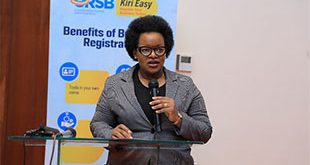
Big industries boost company sales in first half of 2018
Kampala, Uganda | ISAAC KHISA | There is good news at Umeme Limited. The power distributor has recorded an increase in net profit by Shs20bn to Shs61 billion in the first half of 2018 compared to the same period a year before. Financial statement also shows that the company recorded a 10.3% growth in revenue to Shs768.3billion for the six months to June this year compared with last year driven by a reduction in energy losses, improved supply availability, reliability and increased power purchases stemming from additional customers and higher industrial capacity utilisation.
The company’s energy losses fell from 17.5% in 2017 to 16.7% in 2018 amidst increase in customer numbers. This performance puts it in a good financial position after recovering from Shs115.2bn loss that was as a result of the changes made in its license by the industry regulator –Electricity Regulatory Authority.
ERA made Amendment 5 in its license that denied the company of an accumulated five year extra income from the sale of extra units of electricity sold beyond the set target.
This comes when the company’s share price is oscillating between Shs300 and Shs350 compared with around Shs 490 recorded in the same period under review on the Uganda Securities Exchange.
Commenting on the results, Umeme Managing Director, Selestino Babungi said electricity demand is on a steady growth and this could see the company record a rise in profits. “…the sector is growing. Maximum demand grew just slightly under 600MW.
The main drivers are the large industrial customers who are registering high annual growth rates of up to 13%,” Babungi said. He said electricity demand by industrial consumers grew by 8.6%, up from the 7.5% registered in the same period the previous year.
Babungi said the setting up of National Cement Company and the new Hima Cement plant, the two new cement plants in Tororo and the expansion of Tororo Cement Industries, all of which were fully commissioned, boosted industrial sales.
“Existing industrial consumers like Coca-Cola and Roofings have also boosted their production. The Buy Uganda, Build Uganda drive is helping a lot. The South Sudan and DR Congo markets have also reopened. Commercial use of electricity is fundamental.
Industrial use is essential in up taking the increasing generation capacity,” he said. He said industrial demand for electricity was in line with the GDP growth, which is projected to grow at over 6% in the FY2018/2019 up from 3.9% in 2017, adding that GDP growth goes hand-in-hand with electricity demand.
In terms of revenue collection, the company said it has maintained an average collection rate of 99.2% over the last three years, while the revenue collection rate for the period under review stood at 102.8%, attributed to the rollout of prepaid metering, recoveries of past unpaid bills, timely payment by industrial customers, government agencies and provision of payment systems available 24 hours per day.
Customer base During the first half of the year, the company added up to 82,373 customers to the grid, increasing its total customers to a record 1.21million. The firm targets to add a total of 200,000 new customers to the grid by end of 2018.
At the same time, customers on prepaid metering increased to 76.3% of the customer base. Based on this performance, the company’s top management has recommended a Shs12.7 dividend pay-out per ordinary share (equivalent to Shs20.6bn) to all its shareholders.
Investments It has invested Shs113.3billion for the period under review – in network expansion and energy loss reduction projects and additional customer connections in anticipation of 780MW from Isimba and Karuma Hydro Power Stations.
Some of these investments include, among others, Kampala Industrial Business Park/Namanve 33kV Industrial ring, GET -FIT Switching Station in Kasese, new connections and Siti II interconnection line to evacuate power from the 16.5MW Siti II Hydro power dam. Others are Kawanda – Kapeeka load transfer project, Upgrade of Gulu substation and Nyakesi Sub-station in Tororo to support growing industrial demand.
Financial analysts say the company’s decision to diversify payment options for its customers as well as increase in demand for electricity by large industrial players could boost its revenue growth going forward.
“On the other hand, there is no clarity on their ability (Umeme) to win the concession,” said Aeko Ongodia, a financial analyst and the chief executive officer of Xeno Technologies, an indigenous investment fund management company. Umeme’s electricity concession ends in 2025.
 The Independent Uganda: You get the Truth we Pay the Price
The Independent Uganda: You get the Truth we Pay the Price


